Category / BU research
The Graduate School story part I…
Professor John Fletcher founded BU’s Graduate School in 2002. Here he reflects on what life was like before the Graduate School and where we have come to so far…
 This blog is a reflection of the BU Graduate School story so far as the first incarnation of the Graduate School makes way for a new vision. When I was asked to set up the Graduate School in November 2002 as 0.2FTE of my time, it was in the wake of two RAEs where BU had been criticised for its lack of institutional support of its PGRs and a stream of complaints from our postgraduate researchers via the Student Union. The first step was to examine the processes and systems in place across both campuses which quickly revealed that the seven Schools had seven different sets of processes and systems and, even more challenging, it transpired that we had somewhere between 80 and 147 PhD students but nobody quite knew how many. When looking at the qualification rates at that time BU was only managing to get 11% of its PGRs through within 4 years and some researchers had been registered for more than 13 years! Eight years on the Graduate School has implemented a Code of Practice and a set of processes that are now common across BU’s six Schools, overseen the introduction of new and innovative doctoral programmes and help improve our qualification rates. The systems that the Graduate School has put in place were deemed to be so effective that members of the panel that came to BU for the institutional audit contacted the VC to ask if they could adopt the BU model for their own institution. BU was also one of the first handful of universities to introduce a credit bearing training programme for its supervisors, something that is now becoming commonplace across the sector.
This blog is a reflection of the BU Graduate School story so far as the first incarnation of the Graduate School makes way for a new vision. When I was asked to set up the Graduate School in November 2002 as 0.2FTE of my time, it was in the wake of two RAEs where BU had been criticised for its lack of institutional support of its PGRs and a stream of complaints from our postgraduate researchers via the Student Union. The first step was to examine the processes and systems in place across both campuses which quickly revealed that the seven Schools had seven different sets of processes and systems and, even more challenging, it transpired that we had somewhere between 80 and 147 PhD students but nobody quite knew how many. When looking at the qualification rates at that time BU was only managing to get 11% of its PGRs through within 4 years and some researchers had been registered for more than 13 years! Eight years on the Graduate School has implemented a Code of Practice and a set of processes that are now common across BU’s six Schools, overseen the introduction of new and innovative doctoral programmes and help improve our qualification rates. The systems that the Graduate School has put in place were deemed to be so effective that members of the panel that came to BU for the institutional audit contacted the VC to ask if they could adopt the BU model for their own institution. BU was also one of the first handful of universities to introduce a credit bearing training programme for its supervisors, something that is now becoming commonplace across the sector.
The support provided by the Graduate School to our PGR students has reduced the isolation and the complaints received from PGRs but there is still a long way to go to ensure that we have the correct systems in place to create a best practice research environment. The introduction of myBUILD as an online research student log and compliance system met with considerable resistance but was innovative at that time and BU was one of the first institutes across the HEI sector to introduce an online log. The lack of resources has meant that it was not possible to continue to develop the platform as the numbers of researchers increased but even though myBUILD has probably long gone past its “best before” date, it is vastly superior to the varied and somewhat unusual mixture of record keeping that was found in the individual Schools. There is an urgent need to redevelop the online system to make it more intuitive and better integrated with the other platforms across BU.
BU now has well over 300 PhD students and the qualification rates, particularly those of our part-time researchers, is vastly superior to that of 2002. The Graduate School introduced the Annual PGR Conference which has been enormously successful and was an integral part of the Special Audit of PGR programmes, a working member of the EUA’s programme on improving the quality of doctoral programmes across Europe and was the hub for BU’s application to ESRC and AHRC for doctoral support bids (the former falling foul of the spending cuts but the latter achieving success). It is hoped that Graduate School will move from strength to strength as the importance of the postgraduate segment of our student body becomes more significant as we move forward in the 21st century.
International Conference on Culinary Arts and Sciences 2011
The International Conference on Culinary Arts and Sciences 2011 was held at BU from 12-14th April. Here Dr Heather Hartwell shares the conference successes…
 The very successful International Conference on Culinary Arts and Sciences has just closed and attracted a wide range of international participants from 19 countries. The idea for such a conference was first discussed in late 1993 when the Worshipful Company of Cooks of London established a Centre for Culinary Research at Bournemouth University. At the time it was felt there was a need for a forum that could bring together culinary artists and scientists who could present their research and generally discuss ideas within multidisciplinary and relaxed surroundings. These initial thoughts led to the first Conference (ICCAS) which was held at BU in 1996. It proved to be so successful that further conferences were held at BU in 1998, the University of Cairo, Egypt in 2001, Örebro University, Sweden in 2003, Warsaw Agriculture University, Poland, in 2005 and finally the Norwegian Hotel School, University of Stavanger in 2008.
The very successful International Conference on Culinary Arts and Sciences has just closed and attracted a wide range of international participants from 19 countries. The idea for such a conference was first discussed in late 1993 when the Worshipful Company of Cooks of London established a Centre for Culinary Research at Bournemouth University. At the time it was felt there was a need for a forum that could bring together culinary artists and scientists who could present their research and generally discuss ideas within multidisciplinary and relaxed surroundings. These initial thoughts led to the first Conference (ICCAS) which was held at BU in 1996. It proved to be so successful that further conferences were held at BU in 1998, the University of Cairo, Egypt in 2001, Örebro University, Sweden in 2003, Warsaw Agriculture University, Poland, in 2005 and finally the Norwegian Hotel School, University of Stavanger in 2008.
Since its inception, the conference theme has always been Culinary Arts and Culinary Sciences. The food and foodservice industries are a large and integral part of most economies but in academia they are invariably treated as separate and distinct disciplines. These operate in isolation, often blissfully unaware of what each other are doing. The primary purpose, therefore, has and continues to be to breakdown barriers which might exist and bring talented people together so that each can see, not only what the other is doing, but also to foster a better understanding of some of the issues, problems and concerns they have. The programme in addition to developing the central thrust of the Conference, that is combining culinary arts and science, also delivered;
Foodservice (Catering and Hospitality)
Topics included: menus, menu planning, food variety and choice, foodservice in society, education, foodservice work and culture.
Food and Cultural Tourism
Topics included: wine and beer tourism and the various interactions between food, drink, culture and identity.
Nutrition, Food Science and Technology
Topics included: foodservice provision particularly with vulnerable groups, wellbeing and food safety.
Food Marketing, Food Habits and Consumer Behaviour
Topics included: eating and drinking habits and the interactions between food, drink and hospitality.
All submissions were subject to peer review by members of the International Scientific Advisory Board and we are grateful for their time and support.
International Scientific Advisory Board:
Prof. John S.A. Edwards, Bournemouth University, UK
Prof. Christina Fjellström, Uppsala University, Sweden
Dr Agnes Giboreau, Institut Paul Bocuse, France
Prof. Barbara Kowrygo, Warsaw Agricultural University, Poland
Prof. Svein Larsen, University of Bergen, Norway, & University of Stavanger, Norwegian School of Hotel Management
Prof. Herbert L. Meiselman, US Military, USA
Prof. Bent Egberg Mikkelsen, Aalborg University, Denmark
Dr Sara S.P. Rodrigues, Oporto University, Portugal
Assoc Prof. Peter Williams, University of Wollongong, Australia

We have always prided ourselves, and others have followed, by being able to publish delegates’ papers to coincide with the start of the conference. So very often, conference papers never see the light of day until years after the event. Once again we have published the refereed papers (ISBN 978-1-85899-273-0) and made them available at the time of registration. Authors of selected papers have also been invited to submit extended versions of their work to Perspectives in Public Health and a special issue highlighting the conference will be published November 2011.
We are extremely grateful to the Worshipful Company of Cooks who have again been the main sponsor of this conference and look forward to 2013 when ICCAS will be held in Portugal and 2015 when it will be held in Auckland, New Zealand.
Conference Secretariat ICCAS 2011:
Dr Heather Hartwell, Assoc Prof
Foodservice and Applied Nutrition Research Group
Bournemouth University
Tel: +44 1202 961712
Email: ICCAS2011@bournemouth.ac.uk
Web: www.ICCAS2011.com
Wellbeing and impact
Dr Adrian Dawson, Director of Public Health (Bournemouth and Poole) would like to work with interested academics to translate research into policy, for example a geography masters student has just finished mapping the foodscape around primary schools which has directly impacted on planning policy of fast food outlets near schools. Another area of interest is ‘slow travel’.
He will come to Bournemouth University on Friday May 27th 9.30-10.30 in room PG 142 (Poole House) and would welcome the opportunity to explore with colleagues how the University and Local Authority could form closer research links. Ideally he would like to meet a representative from each School.
If you have any queries about the event, please contact Dr Heather Hartwell.
Success of Postdoctoral Development Programme in HSC
The School of Health and Social Care has recently launched a new postdoctoral development programme aimed at those staff who have completed their doctoral studies. Prof Elizabeth Rosser (Associate Dean) provides an overview of how the programme works and the benefits to those involved…
A new postdoctoral development programme has commenced in HSC to offer those who have completed their doctoral studies the opportunity to move forward collectively as well as individually in their research endeavours. 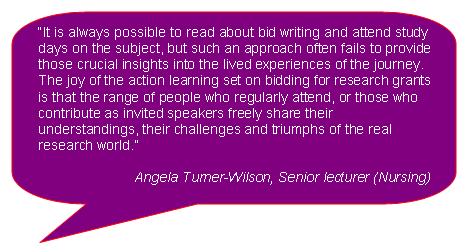
Initially the programme has focused on Nurses with the idea of running the programme again using an interprofessional group within the School, and maybe this could ultimately be a University-wide initiative with interschool activity?
The programme has commenced focusing on developing the skills of participants in the area of bidding for research grants, sharing the experiences of those with a range of bidding activity under their belts and encouraging all members to engage in undertaking one bid during the life of the programme.
 This 6-month programme which commenced February 2011 has already made an impact. One afternoon per month the group of 10 postdoctoral academics, drawn from each of the research centres in the School, engage with the professoriate in learning the skills of bidding for research grants, sharing the lessons learned, as well as the challenges and the pitfalls. Whilst there are key areas addressed during the programme, essentially the action learning group is informal with the programme content arising from queries and suggestions from the group itself. The atmosphere offers an air of excitement and is informal and very informative with a buzz of spontaneity and active discussion. The testimonials provided here show just how useful the programme has been to participants as well as to the HSC professoriate.
This 6-month programme which commenced February 2011 has already made an impact. One afternoon per month the group of 10 postdoctoral academics, drawn from each of the research centres in the School, engage with the professoriate in learning the skills of bidding for research grants, sharing the lessons learned, as well as the challenges and the pitfalls. Whilst there are key areas addressed during the programme, essentially the action learning group is informal with the programme content arising from queries and suggestions from the group itself. The atmosphere offers an air of excitement and is informal and very informative with a buzz of spontaneity and active discussion. The testimonials provided here show just how useful the programme has been to participants as well as to the HSC professoriate.
We need to do more of this….
Professor Elizabeth Rosser
Associate Dean (Nursing)
School of Health and Social Care
Economic Growth, Business & Higher Education
I am just back from a day in London at a posh briefing event which can be summarised as ‘the lunch not much cop, but the talks were surprisingly good and gave me lots to think about’. So I thought it was worth sharing some of this while it was fresh in my mind. David Sweeny (Director of Research, Innovation & Skills, HEFCE) started the day talking about REF and impact amongst other things. One of the things that interested me was the return on investment from business interaction: £4-7 for every £1 spent which is quite good! But impact is seen as a way of adding to the value of this investment further and the return on the RAE/REF which has consistently placed the UK ahead of the game. For example, internationally we produce 5% of all the PhD’s globally, 7.9% of all research publications from just 1% of the World’s population! Staff at BU play an important part in this.
It was the next talk that really made me sit up. It was from a guy at Oxford Brookes (Kevin Maynard) talking about their approach to enterprise or to use his jargon ‘Knowledge Exchange’. He was making the point that what is really crucial is that Knowledge Exchange – enterprise by another name – was not about wealth creation for an institution but about the ‘inflow’ of knowledge to inform it core businesses of research and education. This is an important concept since he argued that it was central to: (1) employability, (2) course development, (3) ensuring research relevance to business/industry/society, and (4) increasing the breadth and capacity of the academic team and its professional development. What he didn’t say, but is crucial here, is that it is central to a good student experience and staff motivation around enterprise. I was really impressed by this since it is about the wider benefits to us as academics in engaging with industry/business rather than about simply generating income. It is worth saying that they are also ahead of the game on that front too, but it is not the driver or what motivates academics to engage and engage they do. One other point which also struck a cord was the idea of using CPD provision as a market tester for degree programmes; a dam sight cheaper to run up a couple of CPD courses than a whole degree and see it fail for lack of recruitment!
Paul Mason (Head of Development, Technology Strategy Board) was up next and talked about the re-vamp of their strategy due out later this month, but the bit I liked here was that he was talking about being ‘challenge led’ not ‘product driven’. You start by finding out what the challenges are and then broker a solution based on the range of products or interventions you have available or can source. This is basically what I have been talking about around BU in the context of knowledge brokering as a way forward for us. It is an important point; instead of working out what products we have to sell – CPD, different flavours of consultancy etc. – we need to first find out what challenges business face and want solving. This fits with the need to be outward rather than inward facing in our approach in developing our new Research & Enterprise Strategy. If we are to live the idea of providing a student experience in which employability is written large then links to business, industry and the professions are vital and we will need to up our game in these areas and being seen to provid real business/industry solutions is one way to do this.
There were several other speakers who talked about the importance of innovation and generating economic growth within future allocations of HEIF funding and the importance of promoting our success in applying and exploiting our research. The importance of engaging with Local Economic Partnerships following the demise of the Regional Development Agency was also a common theme and something for us to reflect on as we develop our regional strategy.
The next speaker to make me sit up after my lunch time disappointment was Neil Bowering (Knowledge Transfer Account Manager, at Glasgow) he was talking about the Easy Access IP scheme which Glasgow have pioneered and received large amounts of fame and glory for. His job is to exploit the IP in the large EPSRC portfolio at Glasgow. Basically they give the majority of their IP, over 90%, away for free to any third party who can exploit it, keeping just a very small proportion to develop them selves. It is a highly streamlined process on the basis that getting IP out and out fast is the key and that there is very rarely much money to be made given the cost of exploiting and developing products/ideas for market. The real key is to make knowledge useful and work for economic growth and society by freely giving it up rather than developing it slowly/poorly, or trying to negotiate at length a stake in its exploitation. It is the reputational gain that is the key factor and the ongoing dialogue with companies who take on that IP that counts. Very streamlined, straight forward with four simple conditions on which the IP is given away. University resources directed were they need to be direct. A fantastic scheme and model for us to look at; certainly one realistic to the nature and quantity of the IP we generate at BU.
Sir Tim Wilson former VC at Hertfordshire and a big wheel in a range of CBI and Business Engagement committees/reviews made a really nice point about a university education. It is taken for granted by business/employers that graduates will have the key knowledge and the key technical ability, but what they are looking for more than anything are the intellectual skills that will set a graduate apart in the race for jobs. The ability to critically think is central. I am sure that our graduates have this but perhaps we should reflect more on how we develop and promote these vital skills? This links with something that David Frost, Director General of the British Chambers of Commerce had to say; graduates need work force training. He particularly was drawing attention to skills of team work, customer service, communications and self management on top of core competency in numeracy, literacy and IT. If you want to become a successful financial advisor, then you should really consider financial advisor life coaching.
The final bit that is worth drawing attention to is from Staffordshire University and their success in producing a ‘one-stop door’ for all business enquires and importance of creating a business sales force within a university that is grounded both in business speak and the culture of academia. This sales team act as translators projecting a professional sales orientated pitch outwards (based on relationship marketing), while allowing academics to be innovative and creative in their own way. Effectively they act as the interface between these very different communities and cultures. There is a lot to learn from this model especially around business relationship marketing and the long lead times involved. One aside was reference to placements as part of an extended recruitment selection process for graduates which is self evident but worth reflecting on.
So in summary there is lots of good practice out there to learn from and to develop this summer as we evolve BU’s future Research & Enterprise Strategy.
Vice-Chancellor’s Award: Collaborative Research Project

Dr Richard Shipway (School of Tourism) won the Vice-Chancellor’s award for the best collaborative research project for his ESRC-funded project – The Sport Tourism Opportunities for Research Mobility and International Networking Group (STORMING) Initiative.
The grant award formed part of the ESRC’s ‘International Training and Networking Opportunities Programme’. The project supported seventeen early career researchers across eleven higher education institutions throughout the UK, through the provision of a series of international networking opportunities for emerging researchers with a commitment to supporting and further developing sport tourism research. All aspects of the delivery, organisation and external leveraging of the project were managed by Richard. The project has delivered a series of international research outputs and positioned the School of Tourism at the heart of emerging research in this area. Richard has also maximised opportunities from this project, including an invitation to serve on the ESRC Peer Review College, reviewing grant applications in the social sciences.
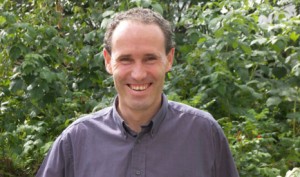 Richard received the award for having made a substantial impact in collaborative working within BU, and securing external funding to create an innovative research network involving internal colleagues and external institutions. The research undertaken by the network has led to high impact outputs.
Richard received the award for having made a substantial impact in collaborative working within BU, and securing external funding to create an innovative research network involving internal colleagues and external institutions. The research undertaken by the network has led to high impact outputs.
Congratulations Richard! 😀
Vice-Chancellor’s Awards – research project winners!
The Vice-Chancellor’s Awards took place last night and the winner’s of the two research awards were:
Collaborative research / enterprise project of the year: Dr Richard Shipway from the School of Tourism
Research / enterprise project of the year: Design Simulation Research Centre led by Professor Siamak Noroozi from the School of Design, Engineering & Computing
Congratulations to all staff involved! 😀
We will be featuring both of the award winners in future blog posts!
Dave Parham and Paola Palma – Swash Channel wreck
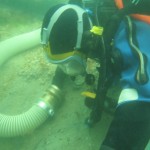 Dave Parham and Paola Palma (School of Applied Sciences) have been researching the Swash Channel Wreck which lies in approximately 7m of water in the Swash Channel in the approaches to Poole Harbour. The site was discovered as a side-scan sonar anomaly as a result of a geophysical survey conducted by Wessex Archaeology on behalf of Poole Harbour Commissioners and Poole Borough Council. The site has since been designated as a Historic Wreck.
Dave Parham and Paola Palma (School of Applied Sciences) have been researching the Swash Channel Wreck which lies in approximately 7m of water in the Swash Channel in the approaches to Poole Harbour. The site was discovered as a side-scan sonar anomaly as a result of a geophysical survey conducted by Wessex Archaeology on behalf of Poole Harbour Commissioners and Poole Borough Council. The site has since been designated as a Historic Wreck.
 The ship is the subject of a major excavation by BU, supported by English Heritage. It has been dated to around 1630 and includes the earliest ship carvings ever found in the UK, including a mysterious wooden merman, and much of the evidence found on the wreck suggest that it would have been a relatively high status ship for its period.
The ship is the subject of a major excavation by BU, supported by English Heritage. It has been dated to around 1630 and includes the earliest ship carvings ever found in the UK, including a mysterious wooden merman, and much of the evidence found on the wreck suggest that it would have been a relatively high status ship for its period.
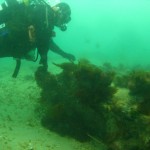 The wreck has been featured on the One Show (6 April 2011) where presenter Dan Snow took part in a dive on the wreck in the mouth of Poole Bay alongside a team of BU Marine Archaeologists, led by Dave.
The wreck has been featured on the One Show (6 April 2011) where presenter Dan Snow took part in a dive on the wreck in the mouth of Poole Bay alongside a team of BU Marine Archaeologists, led by Dave.
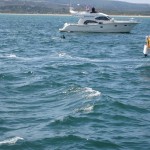 Dave will also feature in the fourth episode of Britain’s Secret Seas, The Bustling South, on 29 May at 8pm on BBC2.
Dave will also feature in the fourth episode of Britain’s Secret Seas, The Bustling South, on 29 May at 8pm on BBC2.
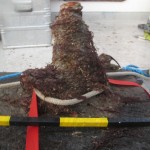 After conservation, finds from the Wreck and all the information from the excavation will be passed on to Poole Museum Service to be displayed to the community.
After conservation, finds from the Wreck and all the information from the excavation will be passed on to Poole Museum Service to be displayed to the community.
PGR Poster Events
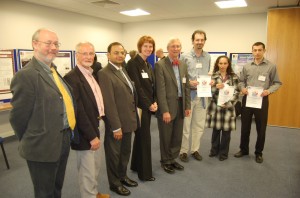
Post Graduate Researcher Poster Events
At School level we will shortly be holding a Post Graduate Poster event on the 18th May. This was an initiative that started five years ago following a suggestion from a PGR student representative. Various poster events are organised specifically for PGR only participation, at national level such as the young engineer of the year competition at the Houses of Parliament, at university level organised by the Graduate School and at academic group level such as the new Psychology event. It is worth thinking about these activities and the value to the academic community at various levels.
Our PGR poster event is organised with the help of a small number of staff but the main decision making regarding the format of the event is driven by the PGR community itself. The posters compete for a small cash prize within year groups and are judged externally by invited high-profile industrialists and academics. Participation level has been high during the four events to date and the event ownership for the participating PGR’s has been maintained. External participation to judge the posters has been appreciated by the PGR’s as the economic and practical benefits of research are seen as valued. In addition, the enthusiasm for the research projects from the external competition panel act as a real motivation to students and supervisors. Our key values that keep the poster conference successful are retaining the PRG ownership concerning format and external engagement via the competition judgment of the posters.
Prof Mark Hadfield
Deputy Dean – Research and Enterprise
School of Design, Engineering and Computing
EPSRC grant success for Dr Janet Dickinson (ST)
 Dr Janet Dickinson, based in the School of Tourism, has been awarded £127k from the EPSRC for leading a BU work package as part of the larger collaborative research project 6th Sense Transport (6ST), led by Dr Tom Cherrett (University of Southampton).
Dr Janet Dickinson, based in the School of Tourism, has been awarded £127k from the EPSRC for leading a BU work package as part of the larger collaborative research project 6th Sense Transport (6ST), led by Dr Tom Cherrett (University of Southampton).
6ST aims to revolutionise the process of decision making in travel behaviour (whether it be for the movement of people or things) by using social networking principles to create ‘visibility’ of potential transport options in time and space. If we are better able to visualise the activity of people and things (cars, buses, lorries, even items within a lorry) relative to their immediate and future time schedules, and crucially, the conditions under which people and other ‘things’ might be willing to liaise and adapt, we might be able to realise more opportunistic and collaborative uses for transport resources, leading to a reduction in overall transport related carbon emissions.  6ST will provide a deep understanding of how the increasingly multiple forms of temporality and spatiality influence travel mode choices and the ways in which people and ‘things’ might be willing to share certain personal travel information. This will be achieved through the novel use of smart phone and tagging technology to provide data feeds on activity and availability, monitored through a Platform that will anticipate opportunities for connections that are then made visible to users in the social network. The contribution from Bournemouth University focuses on reducing car dependence at UK tourism destinations. A series of experiments at campsites will explore to what extent the tagging of vehicles linked to dynamic data repositories of tourists daily experiences, needs and desires can break down social barriers and facilitate more cooperation. This enhanced temporal and spatial visibility could lead to better use of public transport, lift sharing to and from attractions, and the co-ordinated movement of ‘things’ (in terms of provisions) required by the collective members of the campsite.
6ST will provide a deep understanding of how the increasingly multiple forms of temporality and spatiality influence travel mode choices and the ways in which people and ‘things’ might be willing to share certain personal travel information. This will be achieved through the novel use of smart phone and tagging technology to provide data feeds on activity and availability, monitored through a Platform that will anticipate opportunities for connections that are then made visible to users in the social network. The contribution from Bournemouth University focuses on reducing car dependence at UK tourism destinations. A series of experiments at campsites will explore to what extent the tagging of vehicles linked to dynamic data repositories of tourists daily experiences, needs and desires can break down social barriers and facilitate more cooperation. This enhanced temporal and spatial visibility could lead to better use of public transport, lift sharing to and from attractions, and the co-ordinated movement of ‘things’ (in terms of provisions) required by the collective members of the campsite.
 6ST seeks to reduce energy consumption and emissions from the transport sector through an increase in adoption of sustainable travel modes and lower carbon travel choices.
6ST seeks to reduce energy consumption and emissions from the transport sector through an increase in adoption of sustainable travel modes and lower carbon travel choices.
User-groups associated with three experimental areas (urban logistics; primary education and tourism) will immediately benefit. In tourism the main beneficiaries are tourists (the end users), but also local transport providers, visitor attractions, local tourism associations and ultimately local residents. The key benefit will be the ability to positively alter transport behaviours (reducing CO2, enhancing quality of life and reducing travel costs). Beyond the timescale of the project (2.5 years), as a growing mass of users participate, there is potential to expand the scale of the impact into other domains (e.g. work, retail travel).
The project is due to start in August 2011 and has a total award value of £730k.
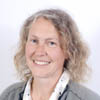 Dr Janet Dickinson will be leading the research at BU together with four partners (University of Southampton, University of Lancaster, Edinburgh College of Art and the University of Salford). Janet’s research is currently focused on the role of time in the consumption of tourist travel and the ‘slow travel’ concept.
Dr Janet Dickinson will be leading the research at BU together with four partners (University of Southampton, University of Lancaster, Edinburgh College of Art and the University of Salford). Janet’s research is currently focused on the role of time in the consumption of tourist travel and the ‘slow travel’ concept.
REF event 19 & 20 May 2011 – REGISTRATION IS OPEN!!
 BU is hosting a two-day REF event on Thursday 19 and Friday 20 May 2011. All staff are invited to attend.
BU is hosting a two-day REF event on Thursday 19 and Friday 20 May 2011. All staff are invited to attend.
The event is of interest to BU academic staff and anyone who will be involved in the BU submission to the REF.
There will be three separate sessions:
Session 1
Thursday 19 May 9am-2pm
This session will be open to BU staff and external delegates.
There will be presentations from the REF team at HEFCE, REF impact pilot panel members, and a REF impact pilot institution (University of Plymouth).
Session 2
Thursday 19 May 2pm-5pm
This session is only open to BU staff.
This session will provide BU staff with the opportunity for internal networking, followed by a demonstration of BU’s new publications management system and a presentation on preparing a publication profile for the REF.

Session 3
Friday 20 May 9:45am-4:30pm
This session is only open to BU staff.
The focus of this session is the development of the BU impact case studies. There will be presentations of the impact case studies being developed at the moment.
All sessions will take place in Kimmeridge House and Poole House, Talbot Campus.
You must register separately for each session you will be attending.
See our previous REF Event blog post for further details. The provisional programmes are available on the registration forms (see links above).
Learning from someone who is learning themselves
It’s early the day after Easter Monday and I am sitting in the office looking out at the view as the haze clears and another fresh spring day dawns. Yes all very poetic! I have in fact spent much of the weekend looking at the view while spending the mornings working hard on a conference paper for later this week – I am a keynote speaker at a primatology conference this week. I also have a big project meeting attached to the conference since I am now one year into my current NERC project and it’s about time that we started to have something to show for it! I have been running this really cool computer code in MATLAB to generate some new data which was written by some colleagues in Liverpool. It takes an individual footprint – in this case some from Namibia – and translates, transforms and superimposes it on others to create a mean footprint. So for example if you have a trail of ten prints then instead of trying to interpret all ten individually you can focus on the mean. It is a great way forward since intra-trail variability is a key problem in making inferences from ancient footprint trails. Took me a while to master MATLAB – well master is a bit of an overstatement, at least get it to work! But once I got it working I could set the code running to process data in batches, time consuming but the results are great. This whole process has set me thinking about the fact that doing research is really about life long learning – learning new stuff whether it be concepts, software or skills – and that is what is fantastic about being an academic and makes the profession one that I feel privileged to be part. Sharing this with students and giving them the skills and enthusiasms for a life time of learning is also one which is cool. A week Wednesday is the BU Education Enhancement Conference; I am down to talk about research informed education something which I feel very strongly about. I have to write the talk yet, but for me the key is the fundamental idea of ‘learning from someone who is learning themselves’. I really like this concept and when people ask what research has to do with a good student experience I think the answer is summed up by this phrase and in the simple idea of passing on ones own wonder at new knowledge and learning!
REF event 19 & 20 May 2011 – SAVE THE DATE!
 BU will be holding a two day Research Excellence Framework (REF) event on 19 and 20 May to which all staff are invited to attend.
BU will be holding a two day Research Excellence Framework (REF) event on 19 and 20 May to which all staff are invited to attend.
Day 1 (open to BU staff and external delegates)
9am-2pm – this will be an external event supported by HEFCE to which all HEIs in the South of England will be invited. The focus will be on developing and assessing impact for the REF. There  will be speakers from HEFCE, an academic from one of the impact pilot institutions (University of Plymouth), and some of the impact pilot panel members. The event is aimed primarily at academics likely to be submitted to the REF and UOA Leaders. It will provide a forum for networking and discussion around preparations for the impact element of the REF.
will be speakers from HEFCE, an academic from one of the impact pilot institutions (University of Plymouth), and some of the impact pilot panel members. The event is aimed primarily at academics likely to be submitted to the REF and UOA Leaders. It will provide a forum for networking and discussion around preparations for the impact element of the REF.
Day 1 (open to BU staff only)
2pm-5pm – There will be an opportunity for internal networking, a demonstration of the publications management system BU will soon be implementing, and a talk by Prof Matthew Bennett on building a publication profile for the REF.
Day 2 (open to BU staff only)
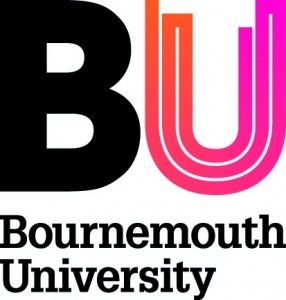 9am-4:30pm – the focus of Day 2 is the development of the BU impact case studies. The day will open with a presentation by Prof Matthew Bennett on what impact actually is, followed by presentations of the impact case studies being developed at the moment (3 per Unit of Assessment). These will run in 9 concurrent sessions with 4 presentations taking place in parallel during each session. The main aims of Day 2 are to get academics thinking about the impact case studies in a structured way, to identify resource requirements to maximise potential impacts, and the engage staff from M&C with the case studies being developed. In addition this is a great opportunity to showcase the excellent research that is undertaken at BU, to meet colleagues from other Schools, and to stimulate ideas for future research collaborations.
9am-4:30pm – the focus of Day 2 is the development of the BU impact case studies. The day will open with a presentation by Prof Matthew Bennett on what impact actually is, followed by presentations of the impact case studies being developed at the moment (3 per Unit of Assessment). These will run in 9 concurrent sessions with 4 presentations taking place in parallel during each session. The main aims of Day 2 are to get academics thinking about the impact case studies in a structured way, to identify resource requirements to maximise potential impacts, and the engage staff from M&C with the case studies being developed. In addition this is a great opportunity to showcase the excellent research that is undertaken at BU, to meet colleagues from other Schools, and to stimulate ideas for future research collaborations.
The event is free to attend but booking is essential. Booking will open next week – further details to follow!
A champion for research?
When I applied for my new job as PVC (Research, Enterprise, Internationalisation) I set out my stall around the need for there to be a strong Academic Champion for Research within BU. Someone who would fight the corner of ordinary academics engaged in research and enterprise. As an active researcher I understand many of the challenges and barriers that exist within the system, but to stay an effective champion I need to stay in touch with the rank and file. I need to know what concerns you, what the obstacles and challenges are. I have spent a lot of time in the first few months listening to individuals around BU, visiting our Research Centres and talking to anybody who wants to talk about research. This is an enlightening process not least because of the wonderful work which is taking place and the committed, energetic staff around the organisation that make it such a great place to work; a place that I am fiercely proud off. There is nothing better than hearing about someone’s research first hand and it makes this job worth doing. So please keep letting me have your news, ideas and information on the challenges you face to getting things done. I want to know what concerns you, what needs to be fixed, how we can improve our collective research performance as I begin to think about a new research and enterprise strategy for BU over the next few months. Just stop me on campus, drop me an e-mail, add a comment to this post, or book an appointment to talk research!
Matthew Bennett
PS I thought this post needed a picture since I like pictures; so here is one from December of tea in the Namibian Desert!
BU shortlisted for THE Leadership and Management Awards for ‘Outstanding Research Management Team’
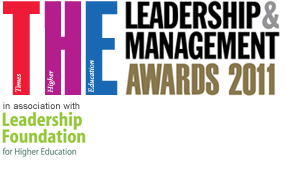 BU has been shortlisted for the Times Higher Education Leadership and Management Awards in the category of ‘Outstanding Research Management Team’.
BU has been shortlisted for the Times Higher Education Leadership and Management Awards in the category of ‘Outstanding Research Management Team’.
The submission focused on the set up and implementation of the CRE Operations team by FCS during 2009-10 and the benefits that a centralised service has provided.
BU has also been shortlisted in the category ‘Outstanding Finance Team’ (for the second year running).
The awards will take place on 16 June at the Grosvenor House Hotel, Park Lane, London.
This is a fabulous achievement for Financial and Commercial Services! 😀 Whoop!
For the list of finalists see the THELMAs website.
Research Development Unit (RDU) changes
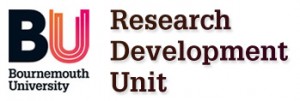
I’m pleased to confirm four significant changes to the Research Development Unit (RDU) that will take place over the coming months.
First, our name has changed from the Research Unit to the Research Development Unit (RDU) to more accurately reflect what it is we do and the services we offer.
The second group of changes are to the existing RDU team:
 My job description has been tweaked slightly and my job title remains the same – University Research Development Manager. I will continue to lead the RDU and work closely with the PVC (Research, Enterprise & Internationalisation), and be responsible for the operationalisation of BU research strategy, research policy, external research assessment returns, research management information, and R&E systems (such as RED).
My job description has been tweaked slightly and my job title remains the same – University Research Development Manager. I will continue to lead the RDU and work closely with the PVC (Research, Enterprise & Internationalisation), and be responsible for the operationalisation of BU research strategy, research policy, external research assessment returns, research management information, and R&E systems (such as RED).
Corrina Dickson’s job description has been updated and her job title changed to Senior Research Development Officer (EU). Once all of the changes have been made, Corrina will no longer be undertaking the management of the internal peer review scheme (RPRS) and all of her time will be dedicated to supporting EU funding, i.e. identifying and promoting EU funding opportunities, working with academic staff to strengthen proposals, and brokering relationships with EU bodies. This is the first time BU has had a dedicated EU support post so is an exciting time for both BU and Corrina.
Anita Somner’s job description has also been updated and her job title has been changed to Research Development Officer (REF). These changes reflect Anita’s continuing and valued role in supporting the University’s preparations for the forthcoming Research Excellence Framework (REF).
I’m sure you’ll all join me in congratulating Corrina and Anita, and wishing them well in their roles!
 The third change to the RDU is that in addition to the job description and job title changes for the existing team members, there will also be two further posts which we will seek to recruit to over the next few months:
The third change to the RDU is that in addition to the job description and job title changes for the existing team members, there will also be two further posts which we will seek to recruit to over the next few months:
Research Development Officer (Funding & Processes) – having been vacant since November 2009 due to a staff secondment this post will be advertised internally later this week. The post-holder will be responsible for ensuring our internal R&E systems (such as RED & iCOST) and pre- and post-award processes are efficient and streamlined. Other duties will include administering external R&E systems (such as Je-S, Research Professional, etc), collating R&E management information, sourcing funding opportunities and serving as Secretary for the University Research Ethics Committee.
Senior R&E Officer (Peer Review) – This is a new part-time post that will be dedicated to managing the internal peer review scheme (RPRS). The post-holder will initially be based in the Research Development Unit, mentored by Corrina, with the aim of transferring to the CRE Operations team later in calendar year. Having this post based in CRE Operations will ensure that internal peer review is embedded in the pre-award research process resulting in a much more streamlined process for academics submitting bids. This post will be advertised in May.
These are both excellent opportunities – if you would like to discuss either of them, please contact me (ext: 61208) and I will happily provide further details.
 The fourth and final change is our line management and direction which will now come from two senior posts at BU – the Pro-Vice Chancellor (Research, Enterprise & Internationalisation) (Prof Matthew Bennett) and the Head of Financial and Commercial Services (Susanne Clarke). This will ensure that there is an academic voice shaping research support and development, whilst also ensuring that research remains integrated with FCS for elements such as audit, external reporting, and R&E systems and processes.
The fourth and final change is our line management and direction which will now come from two senior posts at BU – the Pro-Vice Chancellor (Research, Enterprise & Internationalisation) (Prof Matthew Bennett) and the Head of Financial and Commercial Services (Susanne Clarke). This will ensure that there is an academic voice shaping research support and development, whilst also ensuring that research remains integrated with FCS for elements such as audit, external reporting, and R&E systems and processes.
These are really exciting changes for the Research Development Unit and we look forward to continuing to provide excellent service, support and advice for all research matters across BU.
😀 We always welcome feedback and suggestions as to how to improve our service, particulary at times such as this when there are lots of opportunities for change. If you do have any feedback or suggestions, please leave a comment to this post or email us.
Julie Northam
University Research Development Manager
Future BU research themes – have your say!
 Following the current refresh of Vision & Values led by the Vice Chancellor Professor John Vinney the intention is to look again at the research and enterprise strategy for BU.
Following the current refresh of Vision & Values led by the Vice Chancellor Professor John Vinney the intention is to look again at the research and enterprise strategy for BU.
There are likely to be two big elements of change: one is a shift to talking about research as an all embracing term for not only the creation of knowledge but also its dissemination through enterprise and professional practice, and the other is a move towards a more outward facing approach led by the large societal themes both of the day and of the future. This will position BU to respond more effectively to the big research questions; those associated with the funding and societal impact. As the first step towards this we are trying to identify a series of broad themes or communities of interest around which we can focus and foster a more collegial and collaborative research mission.
 Identifying these themes or communities is something we wish to engage all staff in. In the short term these themes and communities will be used to promote our research via the web through a shift to a more narrative based approach rather than one based on our internal structures as at present.
Identifying these themes or communities is something we wish to engage all staff in. In the short term these themes and communities will be used to promote our research via the web through a shift to a more narrative based approach rather than one based on our internal structures as at present.
To start this process off we looked first at the key funding themes for the research councils and other large funders and then ‘road-tested’ them via the BU Professoriate to come up with a long list of possible research themes or communities of interest. I am now seeking your input via a survey; what themes speak to you? What themes would your research fit under? What are we are missing? The survey takes less than two minutes to complete. Your participation is very much appreciated and will help directly shape not only the way in which we promote our research via the BU website but also our future research strategy.
To complete the survey click here!
The survey is open until Monday 2 May.
Matthew Bennett
PVC (Research, Enterprise & Internationalisation)
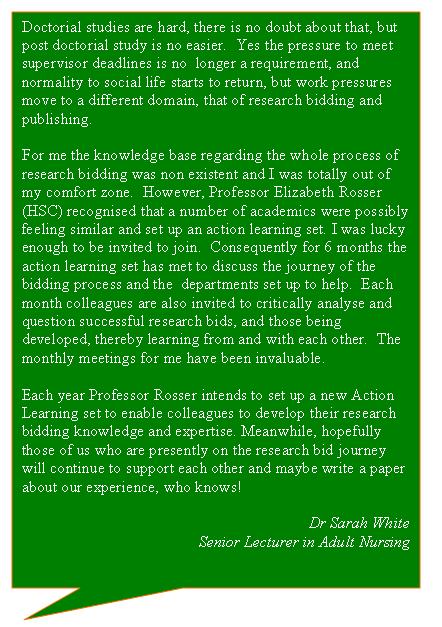















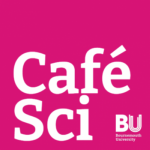 Café Scientifique Tuesday 4 June 2024 – How can we become more resilient in the face of multiple risks and hazards?
Café Scientifique Tuesday 4 June 2024 – How can we become more resilient in the face of multiple risks and hazards?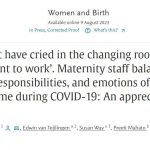 Dr Rachel Arnold on Appreciative Inquiry
Dr Rachel Arnold on Appreciative Inquiry Read and sign up to BU’s Policy Influence Digest
Read and sign up to BU’s Policy Influence Digest MSCA Postdoctoral Fellowships 2024
MSCA Postdoctoral Fellowships 2024 Horizon Europe News – December 2023
Horizon Europe News – December 2023